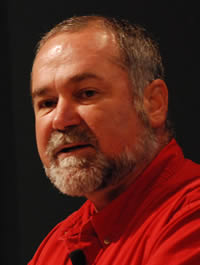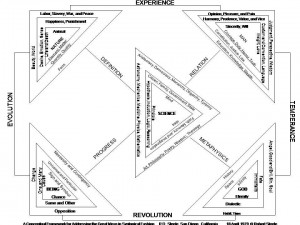
Click Here to See Personal Page
ROBERT STEELE: “Intelligence without integrity is not intelligence.” For some time now the following post, recently re-titled, has been the primary outcome of the frequent searches for the word “integrity.”
2010 Robert Steele: Reflections on Integrity UPDATED + Integrity RECAP
Leadership ethics is a two part challenge. Bosses are not leaders, merely slave-drivers, and often ignorant as well, persisting in archaic sources and methods because that is all they know. Leaders play a 360 degree facilitating role, nurturing — in the intelligence community context — consumers ignorant about the value of intelligence as decision support tailored to each individual consumers needs — one size fits all is Stone Age — “leader” peers lost in their own disciplines or sub-disciplines and lacking in the coherent holistic understanding needed to make a community out of what is now an archipelago of isolated stovepipes — and subordinates who have a right to be constantly learning and afforded full access to all sources of information in all languages, not the thin gruel we force feed them today while isolating them from reality and full spectrum Human Intelligence (HUMINT) and Open Source Intelligence (OSINT).
Ethics is about transparency, truth, and trust. Double-dealing is the norm now in most intelligence communities, relying on secrecy to avoid accountability. Ethical leaders need to have a grip on reality and not just be super-empowered clerks processing dollars to no good public end, only the ends of the recipients of taxpayer dollars and the corrupt legislators that perpetuate capabilities we do not need, cannot afford, and that do not in any event work as advertised.

A true leader will value the truth, use the truth, and embody the truth. When intelligence community “leaders” are not lying directly the the President and Congress, they are lying by omission — failing to point out the many forms of fraud, waste, and abuse for which they are responsible, failing to accept responsibility for outcomes (decision-support) instead of inputs (dollars spent), and generally failing to provide the President with what he desperately needs right now: reliable HUMINT and OSINT relevant to resetting US priorities, policies, acquisition, and operations so as to achieve double the security and prosperity for half the number of flags and dollars — decision support that can be shared with the media and the public.
Let me say that again: bearing in mind my hard-learned lesson from 1992, that to be acceptable to Congress reform must be job and revenue neutral district by district, state by state. What the President and Congress need right now is creative informed thinking that shows them how they can cut the 50% in known fraud, waste, and abuse across the entire government (Agriculture, Commerce, Defense, Energy, Health, etcetera) while addressing the severely under-reported unemployment challenge (unemployment is actually 22.4%, not the fictional 8% both parties and the media parrot). The inability of the US intelligence community to rise to this challenge is the stake in its 20th Century heart.
Ethics is about balancing means (revenue), ways (capabilities), and ends (outcomes). Below from Wikipedia as a context:
Ethics, also known as moral philosophy, is a branch of philosophy that involves systematizing, defending, and recommending concepts of right and wrong conduct.[1] It comes from the Greek word ethos, which means “character”. Major areas of study in ethics may be divided into 4 operational areas:[1]
- Meta-ethics, about the theoretical meaning and reference of moral propositions and how their truth values (if any) may be determined;
- Normative ethics, about the practical means of determining a moral course of action;
- Descriptive ethics, also known as comparative ethics, is the study of people's beliefs about morality;
- Applied ethics, about how moral outcomes can be achieved in specific situations / END /
What this really means is that ethics is ultimately about finding and leveraging the truth — the truth at any cost lowers all other costs — so as to achieve the maximum possible benefit for the maximum number, while avoiding to the maximum extent possible negative outcomes for others. “Morality” is not some loosey-goosey fantasy ideal that is mandated by religious dogma — most dogma is inane. Morality is the embodiment of the lessons learned by civilization over millenia. Morality is cultural convention that has over time demonstrated its value in reducing costs and increasing benefits to the community. Morality, in other words, is intelligence with integrity that works.
See Also:
2010: Human Intelligence (HUMINT) Trilogy Updated
2009 Robert Steele: Politics & Intelligence–Partners Only When Integrity is Central to Both
Graphic: Difference Between a Boss and a Leader
Graphic: Epoch B Swarm Leadership
Graphic: Human Intelligence (HUMINT) J-2 Central
Worth a Look: Book Reviews on Civilization-Building
Worth a Look: Book Reviews on Conscious, Evolutionary, Integral Activism & Goodness
Worth a Look: Book Reviews on Dialog for Truth & Reconciliation
Worth a Look: Book Reviews on Diversity of Voices & Values (Other than USA)
Worth a Look: Book Reviews on Diversity of Voices & Values (USA)
Worth a Look: Books Reviews on Education for Freedom & Innovation
Worth a Look: Book Reviews on Evolutionary Dynamics
Worth a Look: Book Reviews on Leadership for Epoch B
Worth a Look: Book Reviews on Philosophy



